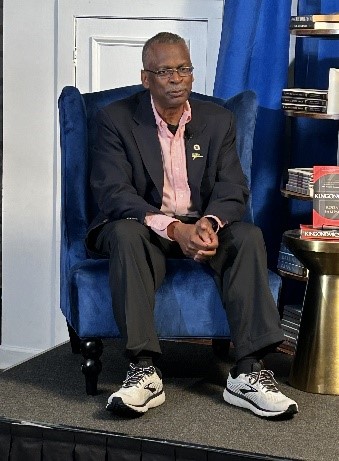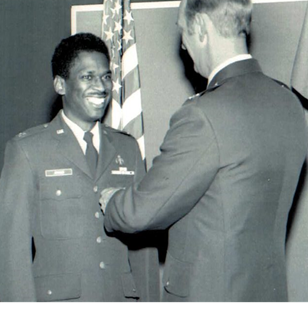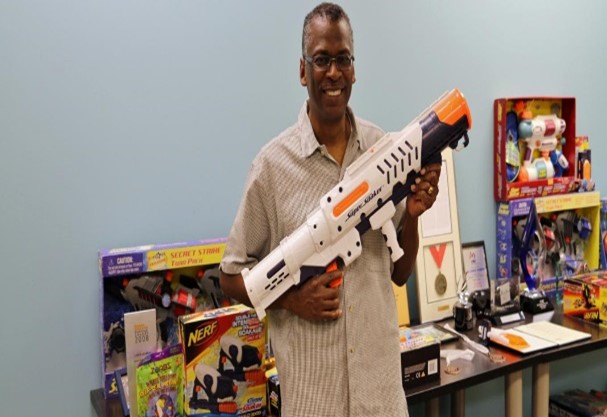Dr. Lonnie Johnson may be best known as the inventor of the Super Soaker®, but he holds over 100 patents. The Mobile, Alabama native and Tuskegee University graduate was the invited speaker by Rodney Sampson of OHUB (Opportunity HUB), who launched #OHUB Fridays on March 31 in New Orleans.
“I’m an inventor. I invent full-time. I have a laboratory where I do experiments and we develop technology,” Johnson tells Think504.com. “I’m focused on energy technology now. We’re spinning out the technology into other companies. “We’re transitioning from laboratory science to real commercialization and generating revenue and having an impact,” Johnson explains.

We focus on energy because we need to transition away from fossil fuels.
Johnson says his initial energy research began with batteries because the idea is we’re going for renewable energy sources.
I’m actually developing the next generation beyond lithium-ion batteries. It’s a solid-state battery that uses glasses and electrolytes instead of liquids. It will be a lot safer. And it won’t be subject to the kinds of fires you see with existing lithium-ion batteries. Plus, it will hold more energy per unit of weight and size. So electric cars will go further.”
“Renewable energy sources like the sun and the wind are not always available, so you need to be able to capture the energy when it’s available and store it. That’s why you need batteries. If we’re going to get away from fossil fuels, we need to have electric cars and, again, there’s a need for batteries.”
“I started looking at other ways of producing energy other than relying on solar and wind. I’ve now invented a new type of engine that converts heat into electricity. We’re most interested in waste heat from industrial processes.”
Lonnie Johnson Brilliant and Humble
Dr. Johnson explains his new engine. “When you raise your hood on your car, you have all the heat coming out of your engine. You must have water in the radiator and a fan and all that. That’s because about sixty percent of the energy available in your gasoline goes to heat. Only about 15 to 20 percent moves your car forward.”
Trained as a nuclear engineer, Dr. Lonnie Johnson worked as a research engineer at Oak Ridge National Laboratory, then joined the U.S. Air Force, heading the Space Nuclear Power Safety Section at the Air Force Weapons Laboratory.

In 1979, he left the Air Force to become a systems engineer at NASA’s Jet Propulsion Laboratory (JPL) to work on the Galileo mission. Returning to the Air Force in 1982, he served in Space Systems at Strategic Air Command (SAC) and was the first flight test engineer assigned by SAC to the Stealth Bomber (B2) at the SAC Test and Evaluation Squadron at Edwards Air Force Base. In 1987, he returned to JPL to work on the Mars Observer and Saturn Cassini projects, according to the National Inventors Hall of Fame.
In 1989, Johnson formed his engineering firm. He licensed his most famous invention, the Super Soaker®, to Larami Corp. The Super Soaker became America’s No. 1 selling toy two years later. Johnson’s patents are also the basis of the Nerf N-Strike line of products.
Johnson started at Tuskegee University as a math major in math but earned a mechanical engineering degree.
Johnson holds over 100 U.S. patents and is president and founder of Johnson Research and Development Co. Inc., an Atlanta-based company that has spun off additional companies, including Johnson Energy Storage and JTEC Energy Inc.
Related: Technology is the Next Frontier
With the creation of the Johnson Thermoelectric Energy Converter (JTEC), the engineer aimed to develop an advanced heat engine that could convert heat into electricity with more than twice the efficiency of existing methods. He believed that once successful, the JTEC technology would be competitive with coal, petroleum, and natural gas, fulfilling the dream of efficient, renewable energy. The JTEC was named by Popular Mechanics as one of the top 10 world-changing inventions of 2008.
Lonnie Johnson Brilliant and Humble
One of his ventures is the Johnson STEM Activity Center, which introduces students from diverse and underserved communities to STEM. Johnson is paying it back and looking out for the children. He was told he shouldn’t try to be an engineer as a youth growing up in Mobile, Alabama.
Johnson was determined to become an engineer. He built a robot in his mother’s kitchen when he was in 11th grade and won first place at a youth science fair sponsored by the University of Alabama.
There is no doubt that Johnson, a living legend, is in the vanguard of the tech revolution. Johnson says to all who aspire to enter technology, “Technology is free. If you can create it, you can determine where the benefits go.”

